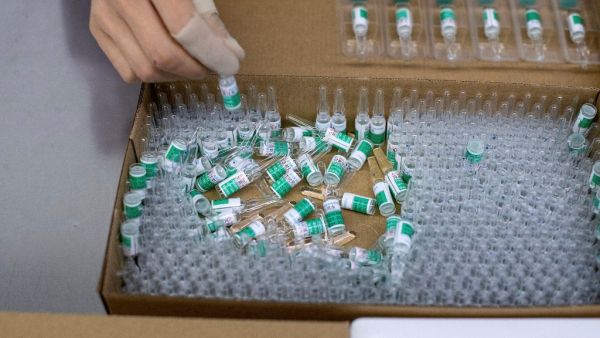A second coronavirus vaccine has been proven to work as US pharmaceutical company Moderna today revealed its jab is 94.5 per cent effective – but the UK hasn't bought any of it.
Early results from the company's final stage of clinical trials bring another landmark success in the global race to end the pandemic after Pfizer's vaccine, which works in the same way, was last week found to be 90 per cent effective.
Moderna's results show that only five out of 95 people who tested positive in the study had been given the vaccine, compared to 90 who had not. There are around 30,000 people in the study in total, each receiving two doses of the jab or a placebo.
And nobody in the vaccine group got seriously ill with Covid-19, compared to 11 in the placebo group, who were given a fake vaccine to compare against the real one.
The results suggest the vaccine significantly reduces the risk of people testing positive for coronavirus or getting sick with Covid-19.
But Britain has not secured early access to the vaccine, meaning it will not get any doses of the jab this year. It may be able to buy some of the 500million to 1billion doses the firm plans to make in 2021, but no deal has yet been announced. The Government says it is 'in advanced discussions' and could get access from spring next year.
The US, meanwhile, has already struck a $1.5billion (£1.16bn) deal for 100million doses, while the EU has an 'unsigned' deal for 160million doses. Japan, Canada, Switzerland, Qatar and Israel have all also secured deals with Moderna, while the company continues 'discussions with a number of countries'. It is expected to manufacture 20m doses this year.
The jab is expected to cost $15.25 (£11.57) per dose, so $30.50 (£23.14) per person, which is slightly cheaper than the $19.50 (£14.79) per dose charged to the US by Pfizer.
Moderna's may be cheaper to distribute, however, because it can be kept in a fridge for up to a month and transported in normal freezers at -20°C (-4°F), whereas Pfizer's must be stored at an ultra-cold -70°C (-94°F) in specialist equipment.
Moderna said it will apply for a licence from the US Food & Drug Administration within weeks, but it is unclear whether it will apply to the UK. British drug regulator, the MHRA, is in the midst of an ongoing review of the vaccine.
The study will continue until 151 people have been infected, and the company admitted the estimate of how effective the jab is might change by the end.
Scientists today hailed the news as 'tremendously exciting' and 'a second dose of very encouraging news', and it comes as Health Secretary Matt Hancock today said the UK is gearing up to start giving out Pfizer's vaccine from December 1.
Virologist at the University of Reading, Professor Ian Jones, told MailOnline: 'Yet another set of vaccine data with 90 per cent plus protection.
'The poor antibody response seen in some natural Covid infections clearly does not apply to purposeful vaccination, which in turn means we can be confident about pushing the pandemic back as and when vaccine rollout occurs.
'For the Moderna vaccine the logistics of the process may also be helped by their stability data which shows a less strict cold chain requirement than some. With three trials having been reported and no major safety issues identified the vaccination program can now focus on deployment and access to vaccines for all who need them.'
And Dr Andrew Preston, a biologist at the University of Bath, told this website: 'That two vaccines, based on this new vaccine platform [mRNA vaccine] give such similar, high levels of protection gives real confidence that the vaccines work.
'Like the Pfizer trial, a vast majority of the cases of Covid recorded occurred in people who had received the placebo vaccine, demonstrating the ability of the Covid vaccine to protect against Covid disease.
'The trial included people in the most vulnerable categories (older age and certain co-morbidities [illnesses]). Although this important inclusion is emphasised in the press release, a detailed explanation of whether the trial data can specify the level of protection for each of these key subgroups is lacking. So, while the headline figure of overall protection is extremely encouraging, some important questions remain to be answered.'
He added the fact that fact the vaccine does not need to be kept in ultra-cold temperatures like Pfizer's, so would be easy to store, was 'a second dose of very encouraging news'.
Dr Preston said it was not necessarily a failure of the Government not to order the jab, because it works the same way as Pfizer's so if one of them failed the other was likely to. The UK bought 40million of Pfizer's vaccine.
A Government spokesperson said this afternoon: 'The news from Moderna appears to be good and represents another significant step towards finding an effective Covid-19 vaccine.
'As part of the ongoing work of the Vaccines Taskforce, the Government is in advanced discussions with Moderna to ensure UK access to their vaccine as part of the wider UK portfolio.
'Moderna are currently scaling up their European supply chain which means these doses would become available in spring 2021 in the UK at the earliest.
'To date, the UK government has secured early access to 350million vaccines doses through agreements with six separate vaccine developers. This includes 40m doses of Pfizer/BioNTech’s vaccine, which is based on the same platform as Moderna’s vaccine and if approved by the medicines regulator, is expected to begin delivery as early as December 2020.'
The interim results of Moderna's study, which finished enrolling its last participants last month and is being been run in the US, were unveiled in a press release today.
In the group of people who received the jab – around half of the 30,000 involved –just five people have tested positive for coronavirus and none have become seriously ill.
In the placebo group which composes the other half, however, 90 people have tested positive and 11 developed severe Covid-19.
Fifteen of the positive tests in the trial were among over-65s, the highest risk group, while 20 were among non-white people, who are also thought to be at higher risk from Covid-19.
The fact that so many more people tested positive in the non-vaccine group suggests that the jab is effective.
Professor Peter Openshaw, an experimental medicine expert at Imperial College London, said: 'This news from Moderna is tremendously exciting and considerably boosts optimism that we will have a choice of good vaccines in the next few months.
'First we heard 90 per cent efficacy from Pfizer and BioNTech, then the Russians said 92 per cent and now Moderna says 94.5 per cent...
'We need more complete details than we have in this press release, but this announcement adds to the general feeling of optimism about vaccines for Covid-19.'
Professor Trudie Lang, a global health researcher at Oxford, hailed it 'very good news indeed', and London School of Hygiene & Tropical Medicine's Professor Stephen Evans added it was 'further encouragement that vaccines will be found to [have] an efficacy that is much greater than we had anticipated'.
Today's results suggest the vaccine works better than the one developed by Pfizer and BioNTech, which was last week revealed to be 90 per cent effective at the same stage in its clinical trials.
Both have a couple more weeks to complete their studies and are then expected to apply to regulators for licences to give out the jabs to members of the public.
They both work in the same way, by using genetic material called RNA from the coronavirus to trick the body into making the 'spike' proteins that the virus uses to latch onto cells inside the body.
The immune system then uses antibodies and T cells to attacks these modified as if they were the real coronavirus and remembers how to destroy the spikes in case it encounters the real thing in the future.
Moderna found that its vaccine, which is given in two doses, was 'generally safe and well tolerated'.
It said the majority of side effects were mild or moderate. The most common 'severe' effects were pain at the site, muscles or joints; fatigue and headache. These, the company said, were 'generally short-lived'.
The firm said safety information will be updated as the study goes on, and the estimate of accuracy may also change when the final results are published.
Moderna said its vaccine can be stored in a normal fridge for up to a month before it is given out, meaning it will be cheaper to store and distribute.
Although it must be shipped at -20°C (-4°F), this is not too cold for normal freezers to handle.
Pfizer and BioNTech's vaccine, however, needed to be kept at -70°C (-94°F) at all times until it was about to be used, meaning expensive specialist equipment is needed to transport and store it.
Dr Julian Tang, a respiratory sciences expert at University Hospitals of Leicester said this was 'a massive plus over the Pfizer vaccine' and would be useful in the long term.
Pfizer and BioNTech last week became the first drugmakers to show successful data from a large-scale clinical trial of a coronavirus vaccine.
They said that 94 people in a trial of more than 43,000 have so far tested positive for Covid-19, and that over 90 per cent of those did not receive the real vaccine.
The companies did not reveal the exact number but a 90 per cent efficacy rate suggests that no more than eight people who got the vaccine caught the virus, compared to 86 of those who received a fake jab.
Their announcement triggered a huge drive to set up logistics for giving out a jab across the UK and Prime Minister Boris Johnson gave a televised statement just hours later.
Britain has ordered 40million doses of the Pfizer and BioNTech jab, and Matt Hancock today claimed the Government is 'working very closely' with Pfizer to roll out the drug giant's breakthrough Covid vaccine from the start of December.
The Health Secretary said the UK would be ready to deploy the jab 'as soon as it comes'.
He told BBC Breakfast: 'We'll be ready from the first of December... but more likely is that we may be able to start rolling it out before Christmas.'
Asked how many vaccines Britain would need, he said it depended on how effective they were at preventing transmission.
But there are concerns about the number of people who will refuse to take a new Covid-19 vaccine due to misinformation being spread on social media.
The UK Government, unlike other countries, will not force Brits to take the jab, so achieving herd immunity will be purely reliant on people trusting that the jabs are safe.
Mr Hancock told Times Radio this morning: 'Being opposed to vaccinations where they have been through the rigorous safety processes is entirely inappropriate.
'And I wouldn't advise it for anybody, because we don't propose, and allow vaccines in this country, unless they pass some of the most stringent safety requirements in the world.
'Getting a vaccine – whether it's for flu or hopefully for coronavirus – is something that not only protects you but protects the people around you. So it's a really important step.'
He added: 'The whole of medicine is the story of advances that are based on science and vaccines are one of the most important advances based on science in the history of medicine.
'And other than clean water have probably saved more lives than anything else in the history of humanity.
'That's what the science tells us, and I think that we should be guided by that science.'
There are around a dozen vaccines in the final stages of their clinical trials around the world.
And there are more than 100 more in various stages of development, some of which will fail and some of which may be better than the ones that are nearly finished now.
Experts say waiting for a vaccine better than the first one is not an option because the coronavirus is killing so many people so quickly.
Dr Mary Ramsey, head of immunisation at Public Health England, said the vaccine candidate from Pfizer posed a 'challenge' because it needs to be stored at minus 80C.
She said if the vaccine is approved for NHS use it would be stored in hubs – including hospitals and wholesalers – and then sent to vaccination clinics and GP surgeries.
'The Pfizer vaccine in particular is quite challenging because it has to be stored at minus 80 degrees and then transported around,' she told BBC Breakfast.
'So there will be a balance – obviously you don't want to waste vaccine because this is very precious stock and also, to get the vaccine to the people where they need it.
'So, you know, we're putting plans in place that will really allow us to try and do the programme as soon as the vaccine arrives.'
She added: 'The Pfizer vaccine would have to be stored in hubs in each region and then delivered to GPs.
'We will have hubs around the country that will be storing it. Some of them are in hospitals where they have those very low freezers, but also… maybe some wholesalers in particular parts of the country.'
This article has been adapted from its original source.








